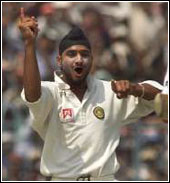Batting capitulation proved Australia's undoing
Daniel Laidlaw
To defend a low target, almost every run of play must
favour the bowling
side. On the final day of the series that did not
quite happen, and India
won despite a magnificent fightback by Australia's
bowlers. More
specifically, fast bowlers Glenn McGrath and Jason
Gillespie.
Australia's pre-series philosophy was to attack the
Indians with pace. They
did. Australia's two leading quicks put in an enormous
effort and formed the
most successful part of the tourists' series. Despite
falling two wickets
shy of a dream, the fast bowlers could not be faulted.
The batsmen are to
blame for not providing enough runs or resistance to
win the match and
series.
 Australia lost the third Test, and therefore the
series, in the first
session of day two. With a precious opportunity
provided by Matthew Hayden's
century platform, Australia had its chance to come
back from the
demoralising Kolkata miracle and score the 500-plus
runs that would have
given it absolute control. Steve Waugh's 'hand-of-god'
dismissal, and Harbhajan Singh's wicket-taking wonders, combined with
reckless batting
threw it away. The collapse of 7/51 in 110 minutes
felt pivotal at the time
and proved to be so.
Australia lost the third Test, and therefore the
series, in the first
session of day two. With a precious opportunity
provided by Matthew Hayden's
century platform, Australia had its chance to come
back from the
demoralising Kolkata miracle and score the 500-plus
runs that would have
given it absolute control. Steve Waugh's 'hand-of-god'
dismissal, and Harbhajan Singh's wicket-taking wonders, combined with
reckless batting
threw it away. The collapse of 7/51 in 110 minutes
felt pivotal at the time
and proved to be so.
Steve Waugh mentioned at the end of it all how proud
he was of Australia's
effort on the final day, and there could be no
question of that. The
unspoken condemnation was of the batting, and the
rapid and momentous slides
it suffered. If Australia were to identify the key
moments where the series
was lost, they would be the final session of the
second Test and the first
of the second day in Chennai.
The last time Australia
lost a series, in Sri
Lanka two years ago, was due to a batting
capitulation. It proved their
undoing again.
 It was appropriate that Harbhajan hit the winning
runs. After all, he'd done
just about everything else for India in a phenomenal
one-man show. In a
remarkable series of superlative matches and record
accomplishments,
Harbhajan's performance stands out. Australia lost a
total of 50 wickets in
the series, 49 of them to bowlers. Of those bowlers,
Harbhajan claimed 32,
the rest of India claimed 17. Often statistics are
misleading, but those
stats accurately reflect his predominance.
It was appropriate that Harbhajan hit the winning
runs. After all, he'd done
just about everything else for India in a phenomenal
one-man show. In a
remarkable series of superlative matches and record
accomplishments,
Harbhajan's performance stands out. Australia lost a
total of 50 wickets in
the series, 49 of them to bowlers. Of those bowlers,
Harbhajan claimed 32,
the rest of India claimed 17. Often statistics are
misleading, but those
stats accurately reflect his predominance.
The quality of cricket, the competitiveness of the
matches, the record
achievements and the sudden, continual switches of
momentum and ascendancy
made it a unique series. If there has been a better
three-match series in
the history of Test cricket, then I would like to see
it. For all the
lamentations over player behaviour, umpiring standards
and corruption, you
would think cricket was in depression. In truth, it's
in a golden age.
Controversy is an omnipresent part of the game. It is
impossible to imagine
Test cricket played better than it is by Australia and
its adversaries right
now.
For India, it would have been impossible to script a
greater comeback and
result. The continual drama and excitement allied to
the fact Australia
virtually had its holy grail by mid-series must make
it one of India's best
ever victories.
On the last day, India surely had to expect that
Australia would defend its
target as fiercely as it could, and would be looking
to seize upon the
slightest opening. In keeping with the theme of the
series, each time it
appeared India was finally safe, Australia grabbed
another wicket to keep
the flicker of hope alive. At seven down with 20 runs
remaining, the match
was as even as it had been for the entire five days.
Nevertheless, the perfect run of play Australia so
desperately needed did
not eventuate, as fate decreed that not one of Dighe's
innumerable
play-and-misses would be an edge that went to hand.
What it would have given
for even 20 runs more worth of the commitment from the
batsmen who failed to
stick with Hayden in the first innings.
India's greatest asset and smartest policy in the run
chase was its run
rate. Teams which become shotless facing small targets
are the ones that
stumble. There is no higher pressure on the bowling
team than that of runs.
The less number of overs you give them to take
wickets, the less likely they
are to bowl you out. Only allowing Australia 41.1
overs, and scoring at four
per over for the majority of the innings, was the
factor that saved India.
Hopefully, the self-belief generated by the series
triumph will make India a
better team. With Srinath and Zaheer Khan, India has a
pace attack to make
use of livelier pitches in the rest of the world. In
Kumble and Harbhajan,
it has a spin combination to win matches at home. With
Das at the top of the
order and a confident Laxman having made No. 3 his
own, India has a smoothly
functioning batting line-up. Whether it is one that
will stand up away from
home remains to be seen. As Australia still suffers on
slow pitches that
turn, so too does India remain vulnerable on faster
ones that bounce. Both
sides have areas upon which to improve.
For Australia, there is not one mitigating factor in
its performance. The
final frontier was just too much. Flaws, hidden on
friendlier pitches and
against weaker opponents, were harshly exposed and
then exploited. At least
it now knows exactly where it stands and what it has
to work on to be
better.
The series loss does not change Australia's current
world standing, only
puts its recent achievements into proper historical
perspective. It may be
the most consistent team, but can't beat the rest of
the world in its own
backyard, and hence shouldn't be classified as
"great." The batsmen must be
able to adapt successfully to varied conditions before
that label can be
applied.
The series was an educational experience. As with some
of the best lessons,
for the Aussies it was an unpleasant one. The final
frontier, so near yet so
far, remains unconquered.
More on Day 5 of the third Test
For Australia, it is the Lost Frontier
Magical 'Bhajji' thanks Kumble, Wright
Adam Gilchrist in Real Audio -- Day 5
Images of Day 5 - third Test
Mail Daniel Laidlaw